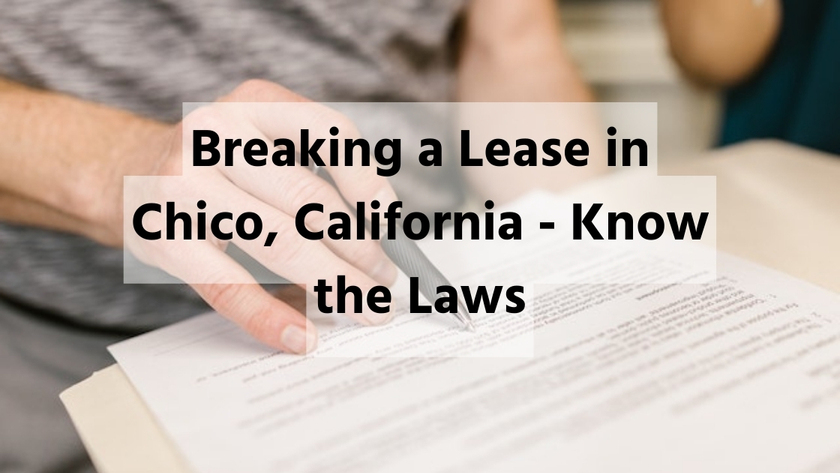Breaking a Lease in Chico, California – Know the Laws

As a landlord in California, it is imperative for you to be as familiar as possible with the rules and regulations regarding rental properties. This includes the laws that affect the process of breaking a lease in California.
Rental Agreement in California
As a landlord, being able to write a comprehensive lease agreement is a valuable skill. Your lease agreement should give your tenants a clear understanding of the penalties they may face should they unjustifiably break the lease. The agreement should also inform your tenants of their rights when it comes to justifiably breaking their lease in California.
Additionally, as a landlord, your lease should include the following information for your tenants:
Written Notice
Your lease, as a landlord, should include the amount of written notice needed for tenants to break the lease in California. If they are terminating a week-to-week lease, they will need to provide 7 days’ notice. If the lease is month-to-month, the notice should be 30 days.
Landlord’s Responsibility to Re-Rent
Landlords are required by the California law to make reasonable efforts to re-rent the home as soon as possible.
Tenant’s Right to Sublet
According to the law in California, as a landlord, you may include a clause in your rental agreement that states the requirement for your approval before a tenant sublets the rental unit. This will mean that your resident cannot sublet the home without your consent, however keep in mind that you may only reject a subtenant request based on legitimate reason.

Unjustified Reasons to Break a Lease in California
While there are a few reasons that a resident may legally break a lease, there are many reasons that will not allow them to end the tenancy early without penalty. The following are all examples of unjustified reasons for a tenant to break a lease:
- The tenant has purchased their own house.
- The tenant is moving for the purpose of a new job or school.
- They wish to downgrade or upgrade their living space.
- The tenant is moving in with a significant other.
- They are relocating in order to be closer to their family or friends.
If a tenant attempts to break their lease early for any of the above reasons, they will receive no legal protection against penalties or fines. This can result in tangible legal and financial consequences for the tenant. If any of the above reasons cause the tenant to want to break the lease, they should ask their landlord to agree to a mutual termination.
Justified Reasons to Break a Lease in California
Now that you are familiar with some examples of unjustified reasons that a tenant may break their lease according to the law, here are some justified reasons for ending a tenancy. A justified reason means that the resident may be able to have an early lease termination without penalty.
Early Termination Clause
As a landlord, you may include a specific clause in your lease that allows the resident to break the lease in exchange for a fee. This fee is typically equal to 2 months’ rent and should cover the cost of lost funds that come with the rental unit sitting vacant before you find a new tenant.

If you choose to include this option, then the California lease agreement should clearly outline the amount of the fee and the amount of notice you will need from the tenant should they want to break the lease.
Active Military Duty
If your tenant is a member of the military and they receive orders to relocate due to deployment or permanent change of station, then they may break their lease early.
In order to break the lease without penalty, the tenant must provide the landlord with proof that the lease was signed before they received the relocation orders as well as proof that they will stay on active duty for at least 90 days.
They must also provide their landlord with a written notice in addition to a copy of their orders to relocate or a letter from their commanding officer.
Uninhabitable Rental Home
As a landlord in California, it is important to always make sure that your rental home is in good condition and remains habitable for your tenants. This is so you can build a positive landlord-tenant relationship avoid legal issues.
The following is a list of qualities that the state of California has deemed necessary when it comes to keeping a rental home habitable:
- Waterproofing and weather-proofing the exterior walls, roof, windows, and doors of the home.
- The ability to access both hot and cold running water in the rental unit.
- Functioning heat, electrical lighting, plumbing, and gas systems.
- Well maintained floors, stairs and railings.
- Sanitary, safe and clean premises.
- An adequate amount of garbage receptacles.

Landlord Harassment or Violation of Privacy
As a landlord, you always want to make sure that your tenant feels respected and safe. This includes respecting their privacy! According to California law, a landlord is required to provide their tenant with at least 24 hours notice before entering the property.
Domestic Abuse, Sexual Assault, Stalking, or Elder Abuse
The state of California provides extra lease protection for tenants who are victims of domestic abuse, sexual assault, stalking or elder abuse. These tenants are provided with early termination rights under specific circumstances.
Other Reasons
There are some other reasons a tenant may end the lease early that are not automatic and must be decided by a court. They include the following:
- The landlord violates the lease agreement.
- The lease agreement is an illegal or unenforceable contract.
- The landlord fails to provide the tenant with the mandatory disclosures of the property prior to the lease being signed.
- The tenant is a senior citizen or has a health issue that causes them to have to move.
Bottom Line
Now you have all the information you need when it comes to the legal process of breaking a lease in California. If you have any further questions on this topic, or regarding any aspect of your rental property, don’t hesitate to contact our team here at IPM Property Management today!
This blog should not be used as a substitute for legal advice from a licensed attorney in your state. Laws change, and this post might not be updated at the time of your reading. Please contact us for any questions you have in regards to this content or any other aspect of your property management needs.
